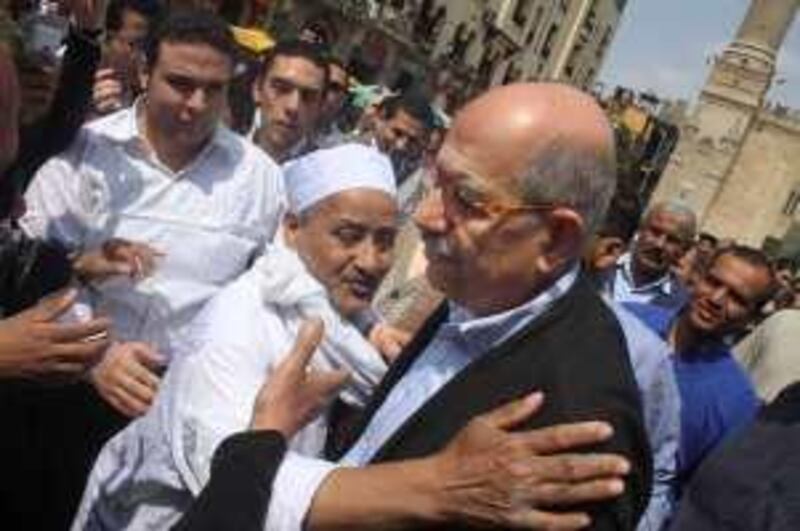CAIRO // Mohammed ElBaradei, the former chief of the International Atomic Energy Agency and now a possible presidential candidate, was greeted by hundreds of passers-by on Friday as he made his first public appearance since returning to Egypt last month. The Nobel Peace Prize winner chose Cairo's Al Hussein Mosque to pray as worshippers and other people recognised him and hurried to shake hands, embrace and kiss him.
Dressed in beige pants, a sky-blue shirt and dark blue, linen jacket, Mr ElBaradei arrived to pray at the mats outside the packed 800-year-old mosque, opposite Al Azhar mosque; however, his younger brother, Ali, and the few young activists accompanying him appeared to convince him to pray inside the mosque. When Mr ElBaradei, who announced late last year that he would consider running for president in 2011, emerged after the prayers, more people rushed to greet him, taking photos with their mobile phones. Some of his supporters started chanting "Long live Egypt" and "Change".
Since his triumphant return to his native country, Mr ElBaradei has been in constant meetings at his villa on the outskirts of Cairo with several opposition figures. The veteran TV anchor Hamdi Qandil was chosen late on Thursday as the new spokesman for the National Front for Change, which Mr ElBaradei had formed shortly after his return. His supporters have announced he is planning more public outings in Cairo and a tour of some Egyptian provinces.
While many Egyptians are yearning for political change, the differences between opposition parties and movements seem as deep as ever. This has thrown doubt on whether Mr ElBaradei, 67, who has spent more than 25 years living outside of his native Egypt, will be able to bridge these differences or be engulfed by them. "There is no alternative to us uniting as one man," said George Ishaq, a leader of Kefaya, or Enough, a small opposition group. "We have to fight our exaggerated egos and our psychological differences," he added to big applause at a meeting of several opposition groups and figures at the Press Syndicate on the eve of Mr ElBaradei's second return to Egypt last week.
There are about 23 political parties in Egypt. The most prominent of them is Hosni Mubarak's National Democratic Party. Opposition movements, including mainly leftists and nationalists, are at odds with the existing established political parties. Political parties have to be sanctioned by the Political Parties Committee, which is headed by Safwat el Sherif, a veteran leader with the NDP. Mr ElBaradei is demanding the freedom to be able to establish new political parties and for a constitutional amendment to allow independents to run in presidential elections and judicial and international supervision of elections.
"I consider it a kind of political hypocrisy to join a party I don't belong to, or believe in its principles to be able to run in the upcoming presidential elections," said Mr ElBaradei in an interview with Al-Arabiya TV that aired Thursday night. "I'm a free and independent man, was, and will remain so in the present and the future. I'm a man of law, believe in democracy, which is lacking here. I don't consider myself a hero and it's not my demand, but I'm the most famous Egyptian in the world. My aim is not fame, Working for Egypt is a duty and sacrifice." Mr Mubarak, 81, has said, in apparent reference to Mr ElBaradei, that Egypt does not need national heroes and those who want to run should abide by the existing rules. Mr el Sherif said there would be no attempt to amend the constitution to placate Mr ElBaradei.
Opposition to his return to Egyptian politics has also come from state-owned media which has portrayed him as a "foreigner" who lived most of his life outside Egypt. he has been accused of not knowing the country's problems and, therefore, not being capable of solving them. Mr Mubarak has not said if he is planning to run in the elections. He has been in power since 1981. Many consider his son Gamal, 46, as heir apparent to succeed his father.
"It is not surprising that Mubarak cannot accurately read Egyptian society's political desires and hopes. He is elderly, isolated and has been out of touch for some time," Steven Cook, a senior fellow for Middle Eastern studies at the US-based Council on Foreign Relations, wrote in Foreign Policy magazine last week. "Contrary to his recent declaration, Egyptians are looking for a hero," he said.
"And they no longer want the false heroics of a discredited line of military officers. "Instead, many seem deeply attracted to a bespectacled lawyer who appears to have the courage of his convictions. "The ElBaradei sensation may end up being little more than a minor diversion in the eventual ascension of Gamal Mubarak to his father's post, but it has revealed more than ever how thoroughly hollow and illegitimate the regime and its myths have become."
nadiamagd@thenational.ae





